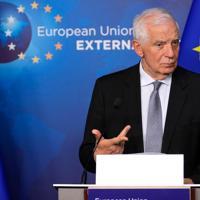Madrid
European Union foreign policy chief Josep Borrell said his biggest regret during his term was failing to persuade the Israeli government to avert death and destruction in Gaza.
“Some 40,000 people have been killed in Gaza, many of them women and children. Why can’t the international community and the EU, after months of failing to achieve a ceasefire, start thinking about a political solution?” he asked in a speech to the European Council on Foreign Relations in Madrid on July 4.
He lamented the EU’s “irresponsibility” in the Middle East crisis.
“This is my biggest frustration and the biggest example that when the EU is divided we can’t even function as the geopolitical actor that we claim to be,” he said.
He also said the EU’s credibility was at risk because of its “fragmentation” and “irrelevance” in this situation.
“The heart of the EU may lie beneath the ruins of Gaza,” he said.
“Show[ing]to the world that life matters, whether in Ukraine or Gaza, is one of the European Union’s most important political initiatives. If, when we talk about Ukraine, we say that cutting off water, electricity and food supplies to civilians is a war crime, then we need to use the same language when we talk about Gaza. But it’s not.”
Borrell said the EU would be judged by other countries from Southeast Asia to Latin America and Africa on its “ability to defend fundamental principles” and its response to the war.
His remarks came during a conversation with Antonio Costa, the incoming president of the European Council, who did not comment directly on Gaza.
Costa, from Portugal, and Borrell, from Spain, are both from the Socialist Party.
In his parting advice to Costa, Borrell urged the former Portuguese prime minister to “make it clear” that he is “the EU’s representative in foreign and security policy” from day one.



